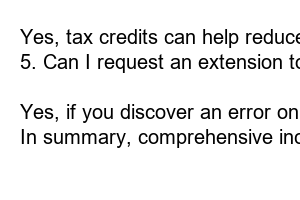종합소득세 대상자
Subject to Comprehensive Income Tax: Understanding the Basics
If you are an individual receiving income, it is highly likely that you will be subject to comprehensive income tax. In this blog post, we will delve into what comprehensive income tax entails, how it is calculated, and its significance in the broader financial landscape. So, grab a cup of coffee and let’s get started!
1. What is Comprehensive Income Tax?
Comprehensive income tax is a type of tax levied on individuals’ total annual income, including wages, salaries, tips, dividends, capital gains, and other sources of income. It is a progressive tax, meaning that the more you earn, the higher your tax rate will be.
2. How is Comprehensive Income Tax Calculated?
To calculate your comprehensive income tax, you need to determine your gross income and then subtract any allowable deductions and exemptions. The remaining amount is then taxed according to the progressive tax system, which typically has different tax brackets with varying tax rates.
3. Why is Comprehensive Income Tax Important?
Comprehensive income tax plays a crucial role in funding government programs and public services. Through collecting taxes, governments can finance healthcare, education, infrastructure development, and social welfare programs, among others. Moreover, income tax ensures social equity by redistributing wealth and reducing income inequality.
4. Common Deductions and Exemptions
Certain deductions and exemptions can help reduce your taxable income, potentially lowering the amount of comprehensive income tax you owe. These deductions may include mortgage interest, charitable donations, student loan interest, and medical expenses, among others. Exemptions, on the other hand, can apply to individuals, dependents, and specific circumstances, such as being a senior citizen or having a disability.
5. The Role of Tax Withholdings
Tax withholdings are amounts deducted from an individual’s paycheck by their employer to cover the anticipated income tax liability. The withholdings are then remitted to the government on the taxpayer’s behalf. Proper tax withholdings help individuals meet their tax obligations throughout the year and avoid large tax bills at the end of the year.
6. Filing and Paying Comprehensive Income Tax
To fulfill your comprehensive income tax obligations, you must file a tax return with the appropriate tax authority. The deadline for filing tax returns varies from country to country, so it is essential to stay informed about the applicable deadlines. Additionally, you must pay any outstanding tax liabilities by the deadline to avoid penalties and interest charges.
FAQs:
1. What happens if I don’t file my tax return?
Failing to file your tax return can result in penalties, fees, and even legal consequences, depending on your jurisdiction. It is vital to meet your tax obligations to maintain good standing with the tax authorities.
2. Can I claim deductions for expenses related to my job?
Yes, certain job-related expenses, such as travel expenses, professional development costs, and supplies, may be eligible for deductions. Be sure to keep proper documentation to support your claimed deductions.
3. Can I offset investment losses against my taxable income?
Yes, investment losses can be used to offset capital gains and reduce your taxable income. It is important to consult with a tax professional or advisor for guidance on how to properly manage your investment losses.
4. Are there any tax credits available to lower my comprehensive income tax?
Yes, tax credits can help reduce your overall tax liability. Common tax credits include those for dependent care, education expenses, and renewable energy investments. However, eligibility criteria and specific amounts vary by jurisdiction.
5. Can I request an extension to file my tax return?
Some jurisdictions allow taxpayers to request extensions for filing their tax returns. However, it is crucial to understand the rules and deadlines associated with extensions to avoid penalties.
6. Can I amend my tax return if I made a mistake?
Yes, if you discover an error on your tax return or forgot to include necessary information, you can file an amended tax return to correct it. Consult with a tax professional for guidance on how to properly amend your return.
In summary, comprehensive income tax is a necessary component of the modern tax system. Understanding how it works, the deductions and exemptions available, and the importance of proper filing and paying of taxes is crucial for individuals looking to fulfill their tax obligations and mitigate their tax liability. Remember, seeking professional advice can go a long way in navigating the intricacies of comprehensive income tax.

